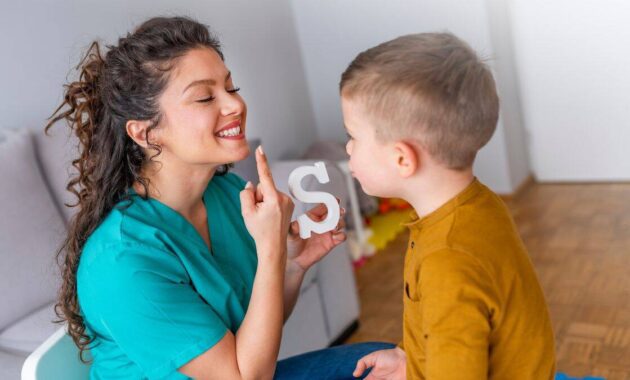Speech and language development help children build confidence and flourish in school. It’s the foundation for clear communication and articulation, and also just an important life skill that everyone needs to have. For some kids, it comes very naturally. For others, it’s a process that requires additional attention. In all cases, speech and language development are certainly bolstered by conscientious effort.
You don’t have to work extremely hard to help your children find success. You simply need to be deliberate and expose them to language in multiple different ways. In this article, we take a look at steps you can take to improve your child’s speech and language development.
Regular Exposure to Language
The easiest and most effective way to encourage early linguistic development in your child is to expose them to language in various contexts. This sounds like the sort of thing that would happen naturally on its own, but really think about how you interact with your toddler. Most of the time, you’re going about your routine. You’re bouncing them on your lap, but are you really engaging with them directly in a linguistic fashion?
Maybe, probably. We make baby noises at them. We coo and ah and babble along with them.
But you’re not speaking to them the way you would to your partner, because why would you? They wouldn’t understand. You’d feel foolish doing it. That’s an entirely rational approach to infant communication, but there is a benefit to getting words in their ears.
You can do this by pointing out things they’re interested in and assigning them words. You can also do it through regular reading and even light exposure to educational video content.
Social settings are a particularly good environment to allow your young children to stretch their linguistic talents. The key is to stimulate them verbally and emotionally in a variety of contexts.
For example, story time at the library will accomplish this on multiple fronts. On one hand, they’re getting the linguistic exposure to new vocabulary words in the format of a story. On the other hand, they’re also getting peer-to-peer interactions.
They’re “talking” with other children and learning to communicate if not verbally, then at least through body language and other earlier forms of expression.
Should You Talk Down to Your Children?
Well, there’s a fine line, isn’t there? On the one hand, overly simplified language or abbreviated vocabulary words are probably going to hold them back in the long run. On the other hand, you obviously don’t need to be discussing the war in Iran or your stock portfolio developments with a child. Though in certain markets, their input would be as good as anyone else’s.
Context is important. You don’t want to confuse them. You also don’t want to coddle them from a linguistic standpoint.
Organic exposure works best. Talk about things they’re interested in: their ball, your dog, a cartoon character, a favorite book, flowers, butterflies, birds. Use common vocabulary words that represent things they are genuinely interested in, and they’ll be more engaged and ultimately more locked into the learning process.
Correct in a Quiet Way
Any child, even those without a specific clinical barrier to speech, will make mistakes with language from time to time. The best approach is to correct them quietly so that they learn the right word without getting discouraged. For example, you might say something like, “Yes, that is a blue bird” when they said “Look at the boo bird.”
Here, you’re acknowledging that they’ve communicated successfully. Clearly, you understand what they were saying – they’re pointing out a bird. But you’re also quietly emphasizing the correct verbiage without making them feel chastised or discouraged. It’s a subtle but important distinction.
The child may not even consciously realize they’re being corrected, but the next time they see a bird, they’ll remember “blue” instead of “boo.” Repetition is ultimately key. Speech errors are very common, but through conscientious educational efforts, it’s very possible to ingrain good habits without your child’s conscious awareness or self-consciousness.
My Child Is Struggling with Linguistic Development. What Should I Do?
First, don’t panic. Normal is a flexible concept in the world of linguistic development. Some kids have a delayed start and go on to perfectly normal communicative lives, independent of any professional assistance. For those who do need a little help, there are fortunately lots of options available.
A good first step would be to contact your pediatrician. They will be able to identify where your child is at relative to typical developmental milestones. You may find that despite the fact that your child seems behind compared to others, they’re actually within a normal range. If they aren’t? That’s perfectly okay. There are speech-language pathologists and other professionals who are more than capable of stepping in to help.
School-aged children are equally capable of improvement. In this case, you may decide to speak with a school guidance counselor or even a school social worker for individualized help. The best thing about going through a school system is that the services will often be free.
It is concerning that a child who struggles with speech can have their self-esteem impacted. It can lead to social issues that translate into increased feelings of isolation or anxiety. Those are definitely the bad things. The good thing? Most barriers to speech are overcomeable, particularly when the child is being supported proactively by a loving family. You’ve got this.
Disclosure: collaborative post
Thank you for reading – if you enjoyed this content, please consider buying me a coffee here
or browse my Amazon wishlist
I really appreciate your support and it helps to keep the site running and for my time 🙂
Disclaimer: This content was automatically imported from a third-party source via RSS feed. The original source is: https://midwifeandlife.com/home-is-where-speech-begins-encouraging-language-development-naturally/?utm_source=rss&utm_medium=rss&utm_campaign=home-is-where-speech-begins-encouraging-language-development-naturally. xn--babytilbehr-pgb.com does not claim ownership of this content. All rights remain with the original publisher.
